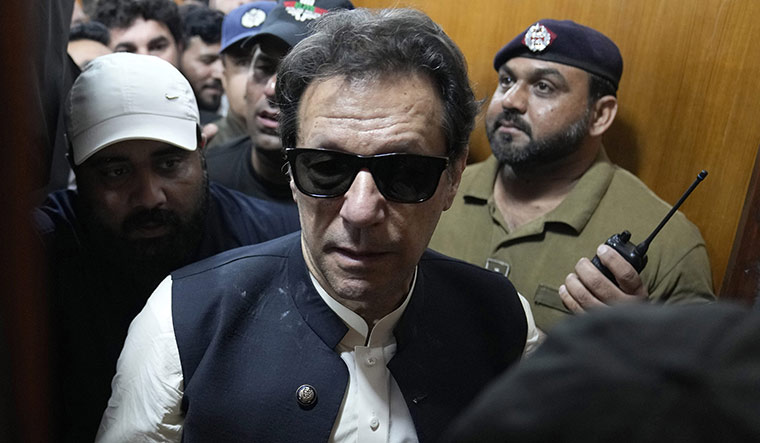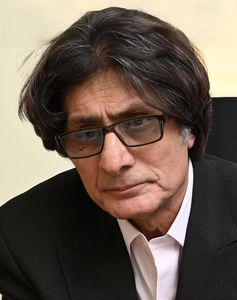Imran Khan refuses to leave the pitch, even though many prominent leaders of his party, the Pakistan Tehreek-e-Insaf, have left him. He is staring at an uphill battle in court on some 170 cases, and the odds are against him. But Raoof Hasan, his new information secretary, says Khan will continue to bat on. Excerpts from an interview:
Q Many prominent faces have deserted the PTI in the past few months. Has this weakened the party?
A The party has been cleansed of rats, turncoats, fence-sitters and the so-called electables. We are back to our ideological moorings. I think the party that shall emerge out of this, or is possibly emerging at this moment, is going to be stronger, more viable and more credible, and it will be more rooted in the ideals for which the party was originally created by Imran Khan. On the one hand, I call it the meltdown moment and, on the other, I call it the phoenix moment. We have gone through the meltdown moment. It is the phoenix moment that we are living through.
Q Imran Khan himself has been a phoenix many times over. Every time they wrote him off, he came back. This time, it seems, he is seriously under difficulty. There are cases against him. How do you see his position right now?
A Well, it is a difficult situation. I cannot hide that. More than 170 cases have been registered against him and he is virtually attending courts on a daily basis. It is taxing, exhausting and very frustrating, because these cases are flimsy, fake and fraudulent. For all the 70 years of his life, there was not even a single case registered against him. Unfortunately, this is not the background of most of the politicians in the country, who have lived through the world of crime. It is a very difficult situation, but he is there. He is not the kind of person to give up. There was pressure on him to leave the country just like there had been pressure on previous leaders who succumbed and then they negotiated and came back. He said, ‘No, I belong here. I’m going to live here and I’m not going out’. So, consequently, the only option is that he face the cases. He attends courts. He is on bail in most of these 170 cases. So, technically speaking, he is a free man, but virtually caged.
Q There are reports that he is actually holed up at home. Does he still enjoy popular support?
A His ratings have gone up in most analyses published in the past six weeks, and he stands at over 70 per cent. That was not the case when he was ousted from power. There is absolutely no comparing him with anybody else. He sits on top. This is primarily because he has been put under this kind of pressure, or he has been subjected to such kind of conditions. He is being mistreated. That is why people are reacting by reposing confidence in his leadership. They want him to come back to lead this country.
Q He has in the past few months looked at building up international pressure. The IMF delegates also chose to consult with him.
A This by itself speaks of his relevance and his power as a political leader. Otherwise, what is the purpose? What is the need? Why did the IMF have to come and consult him? They are dealing with the government in power; they could have easily concluded the deal. They said they wanted his support. There was a conditional support that Imran Khan extended—conditional on the holding of elections on time, as per the constitutional provisions.
As I understand, the distribution of the $3 billion, which has been promised to Pakistan, will be along the following lines: $1 billion will be disbursed to this government so as to carry forth its tasks till the holding of elections after completion of their tenure on August13; then $1 billion will be given to the interim government for the purpose of lasting through the period when it is taking steps to hold the elections, and $1 billion will be given to the government which is elected so as to tide over the initial financial things. This is very important. It speaks of his relevance in Pakistan’s politics. It also speaks of a perception which is growing with time, that he is the next prime minister of the country.
Q If elections are held—the date that everybody seems to be talking about is mid-October—what are your expectations?
A It is a fluid situation. It is very difficult for me to make a statement. My contention, and that of most of the sane voices, is that the government will hold elections only when it is certain that Imran has been neutralised.
It was a three-pronged strategy that they launched to neutralise him: First phase was political neutralisation, which they failed in accomplishing. The second attempt was physical elimination. There was one assassination attempt that he escaped. There were multiple other assassination attempts that were aborted. The third phase is what we are undergoing now. It is to have him implicated in cases and have him and his party banned from taking part in the election.
I don’t know whether this last phase is going to work or not. [But] whichever way you look at it, election in Pakistan without Imran Khan and the PTI will be no election at all. It is not going to be recognised by Pakistan as well as by most of the world.
I think the orchestrators of this situation are also in a dilemma. It is very difficult for them to take a decision whether to continue with their agenda, or to take a step back, introspect and possibly come to a more pragmatic decision. The month of July is critical, much will happen during this month, which will shape things for the future.
Q There is a report of the Pakistan law minister saying former Prime Minister Nawaz Sharif can come back and fight elections.
A We believe in free and fair elections. We believe that everybody who is eligible to participate should participate, including Nawaz Sharif. We are a political party, we are a democratic party, we believe in the ethos of democracy, and we will not deny the right to participate in elections to anybody. But it must also be said at the same time that in the past 15 to 18 months this government has been in power, they have done nothing except to have themselves exonerated from scores of cases of corruption. They have taken self-serving decisions, they have amended laws, rules, regulations and passed resolutions from the floor of the parliament. The purpose of all this has been to ensure that they are not held to account for the crimes that they have committed, and Nawaz Sharif is able to come back to Pakistan to take part in elections. We would still say let there be elections and let them be free and fair. This second part is something that I have serious doubts about.
Q What are the biggest challenges facing Pakistan?
A Economy is number one. We are teetering on the brink of default. The $3 billion IMF package is only going to help us tide over till the holding of elections. The second is, of course, the rule of law. You must have seen the collapse of institutions in Pakistan in the past 13-14 months. Look at the way the judiciary has been assaulted from the floor of parliament, look at the way the judges’ audios have been released, their videos have been released, they have been humiliated, they have been ridiculed, they have been threatened. It has been done in the open. Simultaneously, at a subsidiary level, all other state institutions have virtually collapsed. There is no rule of law in the country, there is no justice system in this country. And a country without justice system and without rule of law does not even qualify to be called a state. We are at that defining moment in our life.
These are huge challenges and anybody who comes to power will have to face these challenges from day one. I am sorry to say this, but we are really looking into the abyss at this moment. If this continues another three months, or six months, if they decide not to hold elections, if they want to continue with this gang of criminals, we will sink deeper into the quagmire.
Q What are the challenges faced by Imran Khan?
A What bigger challenge can there be than a threat to one’s life? He is living through it. He is not the kind of person to back off and he isn’t backing off. He was pressured to leave the country. But he refused. He insists on staying back. He is determined to stay back and live through the challenges that he faces.



